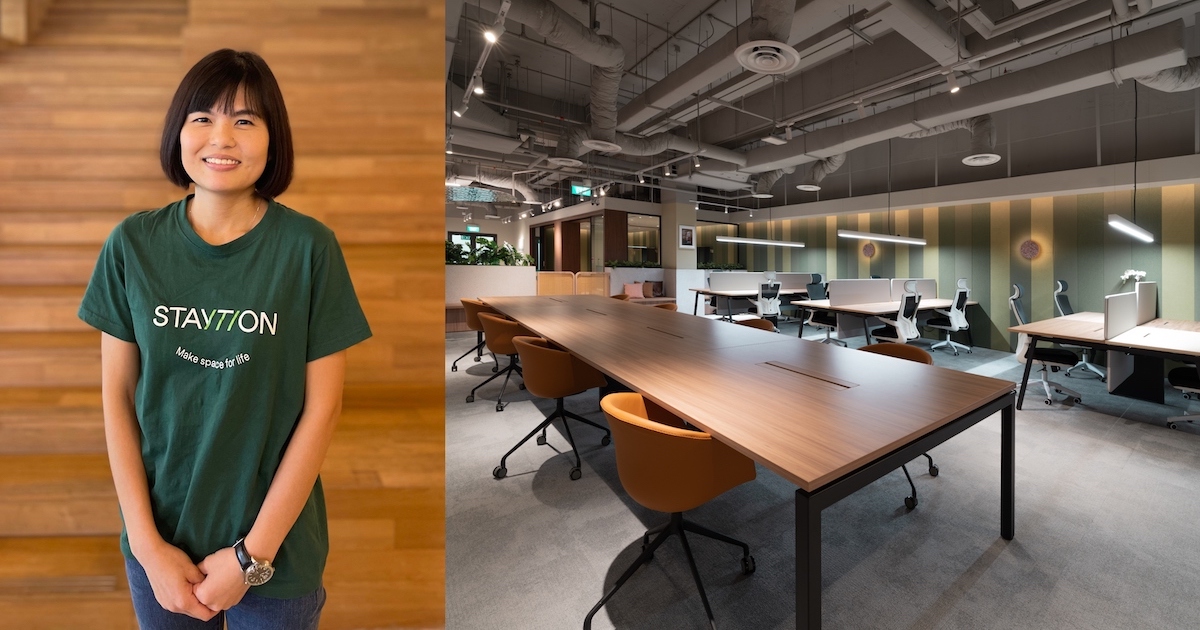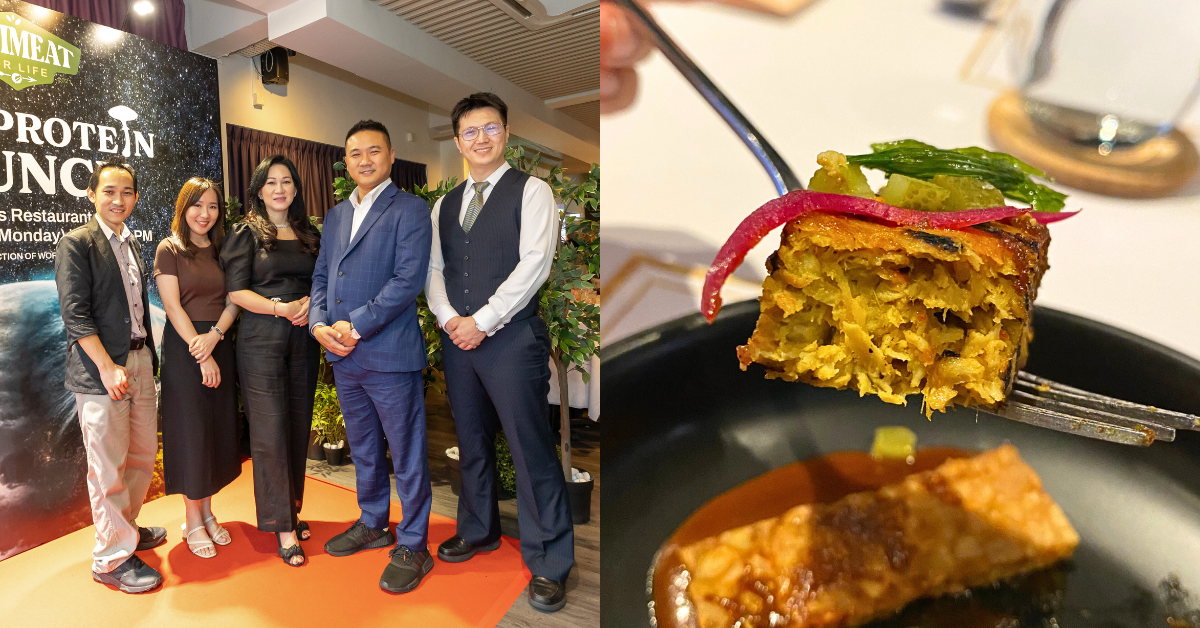Living with a multi-generational family — elderly parents, young kids and a dog — became particularly challenging during the ‘circuit breaker’ period as Singaporeans transitioned to working from home.
For 39-year-old Jane Toh, the endless Zoom calls while caring for her kids was a chaotic and stressful experience.
“While I want to be near home, [it] may not be the most conducive environment for work. I was also constantly chased out of cafés for working there,” she lamented.
This was what sparked the idea to start up Staytion in January 2022, a platform that connects users to co-working and lifestyle spaces in Singapore.

This is her first startup venture, but she is joined by two other startup veterans — Yoeven Khemlani, who is Staytion’s Head of Technology, as well as Toby Cai, their Head of Marketing and Business Development.
Woes of an entrepreneur
Backed by SMRT’s retail and advertising arm Stellar Lifestyle, Staytion started out as a two-person team. Her architect looked at spatial design and development as well as doubled up on operations, while she covered every other aspects.
“My daytime was spent observing consumer behaviour in different environments — co-working spaces, train stations, cafés and shopping malls. My nighttime was spent on translating our observations into a go-to-market plan and an actual business case. We then carried out an extensive islandwide survey, [polling] 600 respondents to test our hypothesis,” explained Jane, CEO and founder of Staytion.
With such a busy schedule juggling work and childrearing, she often heads to sleep at 3am. She only manages to get a few hours of sleep before she has to wake up at 6am to send her kids to school, before starting her sales pitch at 8am.
“It is important to secure the first meeting slot of the day, especially for key appointment holders. Their calendars are usually full and my meeting with them might get cancelled if their earlier meetings over run. Hence, I always make sure I am at their door at 8am sharp,” added Jane.
With a prior background in business and product development, delivering investment pitches is something rather new for Jane so fundraising became a personal challenge to her.
Furthermore, as an introvert, she found it hard to approach investors and venture capitals, which meant stepping out of her comfort zone. She also had to justify valuation and be assertive in the fund ask.
It was a whole new world for me and I received a lot of bad feedback initially. After many dead ends and sleepless nights, the situation improved after I started being more eloquent in explaining the venture and my products to external parties.
One key thing that I have learned during this phase is that my biggest obstacle is myself. I need to first convince myself that I can do it before I can convince others.
– Jane Toh, CEO and founder of Staytion
Her hard work and dedication paid off, leading to the development of its first physical space at Marsiling MRT station, which was recently launched on September 28.
Bridging your work-life needs

According to Jane, Staytion provides a “third space” to meet the needs of communities around MRT stations, with hopes to alleviate the demands of working parents and those living in tight spaces with connected and comfortable spaces.
We created Staytion as a multi-concept, lifestyle space within MRT stations where commuters can work, meet, dine or shop for all their lifestyle needs in one space.
Singapore has one of the best public transport infrastructures in the world, so it makes sense for us to locate our centres in MRT stations to leverage commuter footfalls, while providing a key transit amenity and service offering to the community.
– Jane Toh, CEO and founder of Staytion
At its core, Staytion aims to reinvent and transform the familiar MRT station environment into a more productive and innovative space near their homes, with reliable wi-fi and focus spaces such as meeting nodes, cosy reading nooks and cafés.
“The key pain point that we are resolving is creating an ecosystem that truly supports work decentralisation. Co-working spaces are primarily in the Central Business District (CBD) or in the city areas, and working from home may not always be the most conducive place.”
“Single-use spaces are growing increasingly distant from users and this is deeply impacting landlords. Traditional office users are pivoting to co-working spaces, and shopping malls are increasingly layering on different formats into their retail or F&B spaces,” said Jane, adding that this is a growing trend now.
Spanning below 3,000 square feet, Staytion spaces serve a very targeted transient crowd, thus it acts as a complementary product to the existing co-working offerings in the market.
Staytion’s spaces take on the concept of an urban living room, and are designed in collaboration with multi-disciplinary, award-winning design studio FARM. Together with the designers, they reviewed over 80 floorplans to create a lifestyle space in line with Staytion’s vision.
Prices start from S$4.90/hour for a hot desk

Users can feel free to drop in any day of the week.
There are plenty of cosy seating areas in the outlet, which can be conveniently booked via Staytion’s real-time digital platform to ensure users always have a space on-the-go whenever they require it.
Staytion’s proprietary platform allows commuters and users to have real-time access to seat availability to meet the demands of today’s growing sharing economy.
Using an edge computing platform, Staytion redefines the Internet of Things (IoT) with our artificial intelligence (AI)-driven software and hardware technology. … The Staytion platform also functions as an aggregator to allow users to book third-party spaces, studios and lounges near the stations, as part of our larger service offering.
– Jane Toh, CEO and founder of Staytion

The hourly rate for a hot desk is S$4.90, but users can also opt for a day pass at S$29, which comes with unlimited drinks.
For those who would like to use Staytion’s spaces on a more regular basis, a monthly pass for unlimited drop-in(s) and drinks is also available at S$299.
3 Staytion outlets by end 2022
Following the recent outlet opening at Marsiling MRT station, Staytion is looking to launch two more outlets at Woodlands and Paya Lebar MRT stations at the end of this year.
“These locations are perfect for Staytion as it is outside of the Central Business District, and are also populous districts,” reasoned Jane.
The redevelopment and extension of Woodlands Checkpoint is a huge upgrade and brought about positive improvements to neighbourhoods located in the north, while Paya Lebar is surrounded by Katong’s “old world charms” and is close to the town area.
“We foresee a strong uptake in our Marsiling and Woodlands centres, as we are already receiving numerous inquiries three months prior to the official opening,” shared Jane, with companies approaching them to request the use of Staytion’s space for events and on weekends.
Later this year, Staytion is also looking to launch a collective lifestyle centre in Dhoby Ghaut MRT station.
The multi-concept centre will house a dedicated lounge for commuters to rest their feet and provide popular lifestyle and F&B outlets such as SaladStop!, Kith Café, Takagi Ramen, LuxeStyle and Singrow’s first-in-Singapore urban farm mart concept.
Working in offices is no longer a norm

Although COVID-19 has negatively impacted many businesses, the pandemic has actually helped to open a lot of doors for Staytion, making it an opportune time for them to launch.
A lot of the people that I spoke to are now willing to explore new opportunities and new formats of working as compared to before. Users of our spaces also shared that their employers used to frown upon hybrid work models, but are now comfortable with their employees working anywhere without having to report back daily.
– Jane Toh, CEO and founder of Staytion
She is confident that hybrid work arrangements are here to stay and will be a “permanent culture”. This is a sentiment that’s also echoed by many employers, employees and key industry leaders, whom she met and spoke to over the course of building and running Staytion.
Beyond Singapore, Staytion will be expanding into two to three markets next year.
While overseas expansion is on the business map, Staytion is mindful of keeping their bottomline in check. She noted that investor sentiments have drastically changed in recent months, where the “burn to win” mindset no longer applies.
With new outlet openings, Staytion needs to beef up its headcount, but this is proving to be a challenge with the tight labour market.
To counter this, Staytion has invested heavily in technology and automation to transform and improve job quality. For instance, they use advanced spatial analysis devices to automatically track occupancies in centres, thus minimising the need for staff to manually track and adjust vacancies for bookings.
Featured Image Credit: Staytion








